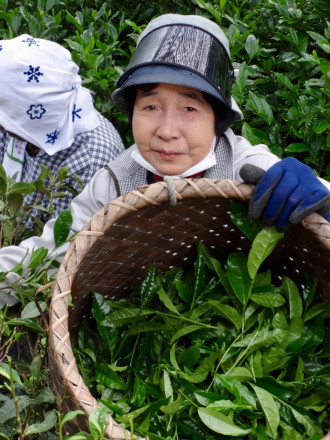Dobra Tea will host two tasting and slideshow events this month focused on tea production and culture in Japan. The presentations draw from the recent travels of Miles Cramer, general manager for Dobra Tea’s Asheville-area operations.
Cramer spent two weeks in May exploring tea regions in Japan along with other members of the Dobra Tea Collective, which has locations scattered around the world, including teahouses in the Czech Republic and Hungary as well as Burlington, Vt., and Pittsburgh.
While he paid visits to the cities of Shizuoka and Ureshino, the majority of his trip was based in Uji, a town south of Kyoto. “It’s kind of a tourist town, but it’s definitely a tea mecca for Japan, so there are teahouses about every half block, and they all have their shincha,” says Cramer.
Shincha means “first harvest,” and Cramer and his group were fortunate to arrive in Japan at the peak of harvest season. “When we arrived in Japan, it was actually kind of lucky because there was a dry winter, and so that pushed the harvest season back two weeks,” he says. “So everywhere [we went], they had these red flags that signified shincha season.”
In Uji, tea is plentiful. “Tea is literally everywhere,” says Cramer, “there will be a gas station, and behind the gas station is a tea field.” Yet, according to Cramer, tea culture is shifting in Japan.
“The interest of the youth in tea culture is almost obsolete at this point. You see tea everywhere. There are vending machines about every 200 feet in Japan, and almost every vending machine has green tea in a bottle. So, tea in Japan is kind of turning into that — it’s bottles, it’s convenient, it’s speed.” This shift is one of the reasons that Dobra strives to honor the traditional, ceremonial tea experience.
“We can turn to Japan and find these high-grade senchas and get excited about it and expose American culture to this culture,” he says. “I think it’s something amazing that Dobra is able to provide the space for people to do that — for people to sit down and spend an hour with a top-shelf Shincha Sencha and have people understand what that sentence actually means.”
While the tea culture in Japan seems to be moving toward convenience, Cramer felt safe to say tea itself is not going anywhere and will always be a large part of Japanese life. “Those tea fields are always going to be there, and the Japanese are always going to drink tea; tea is always going to be around,” he says. “I think tea production will continue in Japan, but it’s just whether people stop to take time with a nice piece of pottery and enjoy the full leaf.”

Travels to faraway tea regions to meet the farmers are common in the Dobra Tea community. “I think it’s important just to reveal what has been going on for hundreds and hundreds of years in these cultures and to clearly and accurately convey and show what this culture is,” says Cramer. “It’s easy to take a tradition and then just immediately interpret it in your own way and act like that’s the tradition. That’s a way that things can get lost in the shuffle, and I think with our connections with these people that I was able to meet that we have a unique opportunity to pass this information from their mouth to our customers.”
Cramer will present photos from his travels and host tastings and discussions as follows:
- 6-8 p.m. Thursday, June 8, at Dobra Tea Black Mountain, 120 Broadway St. Tickets are available here. For details, call 828-575-2424.
- 9-11 a.m. Sunday, June 11, at Dobra Tea Downtown Asheville, 78 N. Lexington Ave. Tickets are available here. For details, call 828-357-8530
Participants at both events will be served sencha, kabusecha, gyokuro, tamaryokucha, kamairicha, yamacha and Japanese pu’erh teas. Cost for each workshop is $25 per person. Preregistration is required.
“Our devoted tea drinkers are always so excited to take our classes after we have traveled to the tea lands because the tea is so fresh, and it tells a story,” says Dobra Tea owner Andrew Snavely. “There’s nothing more exciting than to share travel stories with everyone and pictures to explain where the tea comes from and how it’s produced.”




Before you comment
The comments section is here to provide a platform for civil dialogue on the issues we face together as a local community. Xpress is committed to offering this platform for all voices, but when the tone of the discussion gets nasty or strays off topic, we believe many people choose not to participate. Xpress editors are determined to moderate comments to ensure a constructive interchange is maintained. All comments judged not to be in keeping with the spirit of civil discourse will be removed and repeat violators will be banned. See here for our terms of service. Thank you for being part of this effort to promote respectful discussion.